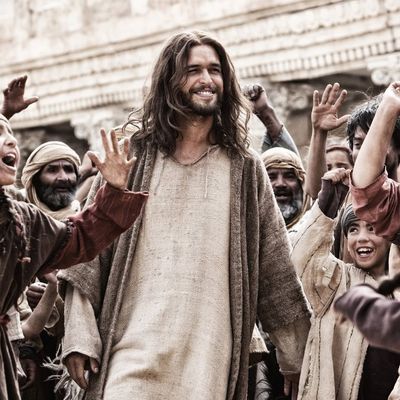
IÔÇÖm about as irreligious as they come, but I still love me a good Jesus movie. ThereÔÇÖs a reason why they call it the Greatest Story Ever Told ÔÇö and it has to do not just with the God stuff but also with the tale of a charismatic rebel who is betrayed by one of those closest to him, and who bravely sacrifices himself for a cause, suffering horrifically in front of everyone, including his mother. Matters of the spirit to one side, this is the stuff of great human drama. Unfortunately, someone forgot to tell the makers of Son of God. Their movie has its moments, to be sure, and the target evangelical audience may well respond enthusiastically, but, unless your own salvation is riding on it, the film is mostly a slog.
Son of God is a modification/compression/reedit of the Jesus parts of last yearÔÇÖs massively rated History Channel miniseries The Bible, which was ten hours long and sped through both the Old and New Testaments, breathlessly reconfiguring the tales of Abraham and Lot and Samson as slow-motion and effects-infused action spectacles. By the time the Jesus story came in episode five, we were ready for a break, and it was nice to see the show settle down from all that rushed, crude storytelling.
This recut version starts off with brief glimpses of some of those early tales (You half expect to hear the narrator intone, Previously, in Judeo-Christian Civilization), but it also omits some of the dodgier elements from the earlier miniseries, such as a Satan who some felt (unfairly, I thought) resembled a certain president. This version is also less reliant on the miniseries cheap TV-level effects, and understandably so: The Bible had a $22 million price tag, which may seem like a lot of money, but consider: There are Kevin Smith movies that cost more than that. But now the whole thing feels so dutiful, so by-the-numbers that you find yourself wishing that some of the more outlandish and potentially offensive stuff was back in there.
Every good Christ movie has its own angle, its own approach to the tale. Director Christopher Spencer and producer Mark Burnett (the TV impresario behind Survivor) mostly go through the motions, but they do try to give the story some additional context by detailing the various political machinations swirling around Jesus ÔÇö the fiery debate among the Hebrew powers-to-be, the contentious negotiations between a very torn Pontius Pilate (Greg Hicks) and a very shouty High Priest Caiaphas (Arian Schiller). But for all the back-and-forth, the words and the conflicts rarely come to life for us; youÔÇÖd never guess that the future of Western Civilization hung in the balance.
Part of the problem lies with, IÔÇÖm sorry to say, the Son of God himself. Jesus is a tough role for any actor. Even the great Max Von Sydow couldnÔÇÖt quite pull it off, in George StevensÔÇÖs grand but dull The Greatest Story Ever Told (1965). How to portray the charisma as well as the conflict, the dual substance of God and Man? He canÔÇÖt just suffer nobly ÔÇö he has to suffer palpably. If he feels no agony, no hurt, no doubt, then what good is the story?┬á Martin Scorsese and Willem Dafoe pulled it off in 1988ÔÇÖs The Last Temptation of Christ by opting to focus almost exclusively on the human side, but they also pissed off many religious viewers. The great Pier Paolo Pasolini (a Marxist, a homosexual, and an atheist) and an unknown Spanish actor named Enrique Irazoqui pulled it off in 1964ÔÇÖs The Gospel According to St. Matthew ÔÇö one of the VaticanÔÇÖs favorite films ÔÇö by going in the opposite direction: Their Jesus was largely inexpressive, but the dusty, v├®rit├® filmmaking around him brought uncommon urgency to the tale. Mel GibsonÔÇÖs The Passion of the Christ, released a decade ago, has many issues, but the combination of tenderness and rage that Jim Caviezel brought to the lead isnÔÇÖt one of them. Son of GodÔÇÖs Jesus, a former Portuguese model named Diogo Morgao, looks the part, at least the way itÔÇÖs been popularly conceived ÔÇö he could have stepped out of a painting on the wall of a suburban home circa 1956 ÔÇö but he has neither the authority of a deity nor the fragility of a human. His performance often feels more like an animatronic Sunday school sermon. When, right before the Last Supper, he has an ominous premonition of his crucifixion, all he can do is flutter his eyelids to try and convey surprise and alarm. It doesnÔÇÖt work.
Until, that is, we get to the crucifixion itself. Here, Son of God distinguishes itself a little bit. Morgado still canÔÇÖt quite manage to bring human agony to his part, but much of the rest of the cast (including Idrissa Sisco as a very fine Simon of Cyrene), picks up the slack. As the Virgin Mary, Roma Downey (a co-producer who is also BurnettÔÇÖs wife and the former star of CBS drama┬áTouched by an Angel) canÔÇÖt bring any inner life to her agony, but her encounter with Jesus at the fourth station of the cross, as she helps him pick his cross back up, is tender and stirring. If only the rest of the film had managed to portray this level of interaction. But unfortunately, Son of God is mostly a stolid mess.


